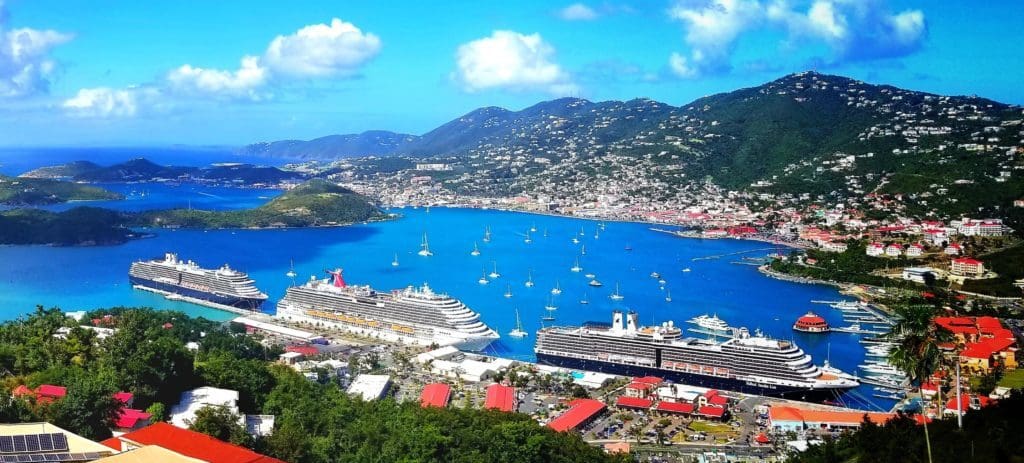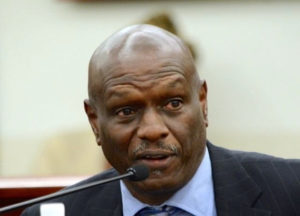
V.I. Port Authority Executive Director Carlton Dowe issued a statement Tuesday night, correcting what he termed “gross misrepresentations” by West Indian Company Limited Board Chairman Jason Charles concerning funding for dredging the St. Thomas Harbor.

At a recent WICO board meeting, Charles said that VIPA had collected $130 million since 2004 that was to be used for dredging the harbor, Dowe said in his statement. “This is a gross and intentional misrepresentation by Chairman Charles. The record is very clear that VIPA has not collected any fees from cruise ship companies for dredging,” he said.
Dowe said that in accordance with the law, VIPA has published a marine tariff that outlines the fees charged to vessels that use the public piers and harbors in the U.S. Virgin Islands. Currently that rate schedule includes two fees charged to cruise lines: port dues and a wharfage fee, he said. Port dues are charged to all cruise ships entering the harbor, and wharfage is charged to ships that berth at VIPA’s docks. WICO charges a wharfage fee to ships berthed at its Havensight dock and possibly other fees, according to the statement.
The Source reached out to WICO officials for comment but did not hear back as of Wednesday evening.
The immediate argument is over just how deep to dredge and just who is going to pay for the dredging. VIPA asserts that 36 feet is sufficient, while WICO says the new mega cruise ships need 40 feet. Dowe has said that will cost $8 million more than the $17 million the government has budgeted. There’s also the question of how soon the project may start.
The conflict has apparently been quietly simmering for some time and boiled over last week after correspondence between the entities went public.
WICO CEO Anthony Ottley recently wrote to Dowe, rejecting the suggestion that the dredging be limited to 36 feet and that if it goes deeper, cruise lines should pay the extra cost. He said parts of the harbor need to be dredged two to four feet deeper than that to accommodate the mega ships that cruise lines are currently building.
In letters to Ottley, several cruise lines also suggested they may discontinue some of their V.I. stops in the future if the dredge is only to 36 feet.
Dowe told the Source last week that he’s not opposed to digging deeper than 36 feet but asked, “Are the (cruise) lines ready to pay for that?” It’s not how deep to dredge; rather, “It’s what you can pay for,” he said.
He also said the Army Corps of Engineers has determined that 36 feet will be deep enough to accommodate cruise ships currently calling on St. Thomas.
As for who should pay, Dowe said in his statement Tuesday that the “fees charged by VIPA to the cruise lines are the revenues used to operate VIPA’s marine division. These fees are necessary to help maintain reasonable cost of operation at all marine facilities in the USVI. They also fund the harbor pilots and other VIPA employees who are responsible for bringing the cruise ships to the WICO dock and all other docks, and to purchase and maintain the harbor pilot boats,” said Dowe.
Moreover, VIPA has never established a segregated dredging fee, said Dowe. “When dredging was necessary, VIPA used its operating revenue or received contributions from the Government of the Virgin Islands to fund the costs,” he said. “As Chairman of the WICO board of directors, Mr. Charles should be well aware of this process. I am certain his WICO administrative staff knows the process and were available to inform him.”
VIPA initiated a meeting with WICO several months ago to collaborate on a strategy to finance the dredging project, and Dowe said Tuesday that it was a surprise that WICO’s chairman would use that gesture as cause to criticize VIPA for carrying out its statutory responsibility.
“The dredging of the harbor at a reasonable cost is a benefit to WICO’s treasury and the USVI economy. This cannot just be conversation between VIPA and WICO, it must extend to the cruise lines,” said Dowe.
Dowe further clarified how ship dues are collected from cruise lines that berth at the WICO Dock.
“WICO does not give any money to the Port Authority. In the past, when WICO operated as a ship’s agent for the cruise ship companies, it collected all the VIPA-invoiced fees from the cruise lines and remitted a portion of those fees to VIPA as required by law. However, this has long since ceased since WICO is no longer a ship’s agent. VIPA now invoices and collects its fees directly from the cruise lines, including those that berth at WICO’s dock,” according to Dowe.
Additionally, the two entities have vastly different mandates, said Dowe. “WICO is not a Port Authority. WICO is an entity that manages a single pier located inside the Charlotte Amalie Harbor. The Virgin Islands Port Authority, by statute, manages all the harbors of the USVI, the public docks and wharves. WICO does not pay any fees to VIPA. Fees are charged directly to the cruise ships that enter the USVI’s harbors,” the director said.
WICO and VIPA submitted a joint application to the U.S. Army Corps of Engineers to dredge the WICO dock to a depth of 36 feet. While that agency has indicated that 36 feet is sufficient to accommodate the ships that will berth at WICO, the application is still pending final approval.
VIPA is prepared to dredge the harbor and is not opposed to dredging up to 40 feet, said Dowe. However, the needed discussion is to determine how the additional cost of $8 million will be provided to accommodate WICO’s request, he said.
“It was never VIPA’s intention to make this a public spectacle. However, misinformation cannot go unabated. VIPA intends to amicably resolve this issue in a manner that will benefit both entities and ultimately best serve the people of the U.S. Virgin Islands,” Dowe said.


